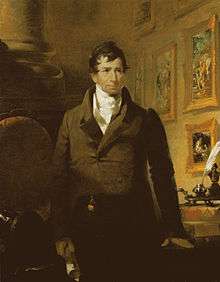William Potts Dewees

William Potts Dewees (May 5, 1768 – May 18, 1841) was an American physician, best known for his work in obstetrics, being described in American Medical Biographies as a "Philadelphian obstetrician [that] was so famous that no parturient woman of the time considered herself safe in other hands."[1]
Dewees received a Bachelor of Medicine and in 1806 an M.D. from the Department of Medicine at the University of Pennsylvania, where he would become Professor of Obstetrics, and Chair of Obstetrics from 1834 to 1841. His fame comes mainly from three books published in quick succession in the mid-1820s, each of which went to at least ten editions: Comprehensive System of Midwifery (1824), Treatise on the Physical and Medical Treatment of Children (1825), and Treatise on the Diseases of Females (1826). Of these, the System of Midwifery had the most lasting influence, introducing ideas from British and continental European physicians (especially Jean-Louis Baudelocque) and becoming the standard reference on obstetrics in the United States for a time.
Works
- An essay on the means of lessening pain, and facilitating certain cases of difficult parturition (1806)
- Comprehensive System of Midwifery (1824)
- Treatise on the Physical and Medical Treatment of Children (1825)
- Treatise on the Diseases of Females (1826)
- Practice of Medicine (1830)
Notes
- ↑
 Kelly, Howard A.; Burrage, Walter L., eds. (1920). "Dewees, William Potts". American Medical Biographies. Baltimore: The Norman, Remington Company.
Kelly, Howard A.; Burrage, Walter L., eds. (1920). "Dewees, William Potts". American Medical Biographies. Baltimore: The Norman, Remington Company.
References
- Baas, Johann Hermann; trans. Henry Ebenezer Handerson (1889). Outlines of the History of Medicine and the Medical Profession. J.H. Vail & Co. pp. 1094–1095.
- "Bachelors of Medicine and Honorary M. D.'s of the University of Pennsylvania". The Alumni Register of the University of Pennsylvania. October 1900. pp. 113–114.
- Haller, John (1981). American Medicine in Transition 1840-1910. University of Illinois Press. p. 153. ISBN 0-252-00806-5.
- Thomas, T. Gaillard (1876). "A Century of American Medicine: 1776-1876: III. Obstetrics and Gynaecology". The American Journal of the Medical Sciences. Charles B. Slack. 72: 133–170 (p. 140).
External links
![]() "Dewees, William Potts". American Medical Biographies. 1920.
"Dewees, William Potts". American Medical Biographies. 1920.
- Hodge, Hugh L. An eulogium on William P. Dewees, M.D: delivered before the medical students of the University of Pennsylvania, November 5, 1842, (1842). From the Digital Collections of the National Library of Medicine.